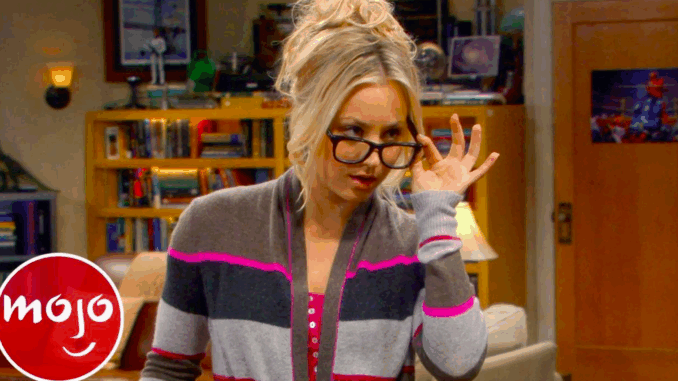
On the surface, Penny (played by Kaley Cuoco) might seem like the odd one out in a group of physicists and engineers. She doesn’t hold a doctorate, she isn’t obsessed with science fiction, and her career trajectory isn’t built on intellect or academia. But as The Big Bang Theory evolved over 12 seasons, Penny emerged as the show’s emotional backbone—grounding the chaos, softening the egos, and quietly becoming the glue that held everyone together.
The Contrast That Defined Her
When the show began, Penny was the archetypal “girl next door.” An aspiring actress from Omaha working as a waitress at The Cheesecake Factory, she was introduced mainly as Leonard’s love interest and as a contrast to the four socially awkward scientists.
Her lack of scientific knowledge was often the butt of jokes, and her seemingly aimless career path stood in stark contrast to the precise, linear paths of her friends. Yet this contrast is what made her character indispensable. Penny brought a sense of reality, warmth, and emotional intelligence that the others—especially Sheldon—lacked.
Emotional Fluency: Penny’s Superpower
What Penny lacked in physics degrees, she made up for in emotional fluency. Throughout the series, she consistently displayed empathy, social awareness, and the ability to navigate human interactions—skills her academically brilliant friends struggled with.
Sheldon, for instance, found it nearly impossible to connect with people emotionally. Yet, Penny was one of the few characters who could talk to him without tiptoeing. Whether it was comforting him during a bout of anxiety or playfully challenging his logic, Penny developed a rare bond with Sheldon that grew richer over time. Her compassion, patience, and no-nonsense attitude made her someone even Sheldon respected.
Her Influence on Leonard and the Group

Leonard, despite his intelligence, often displayed insecurities stemming from his childhood. Penny not only loved him but also encouraged him to stand up for himself and take pride in who he was. Their relationship, filled with ups and downs, showcased Penny’s growth as someone who didn’t just exist in the periphery but who shaped the arc of one of the show’s key characters.
In group settings, Penny was often the peacemaker. She facilitated conversations, planned social outings, and acted as the bridge between the nerdy subculture of her friends and the world beyond. When Bernadette and Amy joined the group, Penny welcomed them, and the trio’s evolving friendship became a highlight of the later seasons.
Career Growth and Realism
One of the most underrated arcs in the show is Penny’s career development. After years of trying to make it as an actress, she pivots to a pharmaceutical sales job—an unexpected but empowering change. Unlike many sitcom characters who remain static, Penny adapts, matures, and embraces a new path. This narrative shift reflects real-life growth more accurately than the instant success often seen in TV plots.
Moreover, her decision not to have children—despite Leonard’s initial desire—was a significant moment of autonomy. While the finale implies a change, her journey includes open discussions about choice, pressure, and self-determination. That storyline subtly challenged the traditional female arcs in sitcoms, portraying Penny as someone who defined her own success.
The Penny-Sheldon Dynamic: A Hidden Gem
Though the show centered around Leonard and Sheldon’s friendship, the relationship between Penny and Sheldon was one of the most layered and emotionally satisfying. Their dynamic went from dismissive and antagonistic in the early seasons to deep and brother-sister-like by the end.
One standout moment is when Sheldon gives Penny a rare Christmas gift and allows her to hug him—a moment that was as surprising as it was touching. In season 7, when Sheldon is afraid of change and decides to leave, it’s Penny he confides in. These moments reveal the trust and quiet support that underpinned their relationship.
Not Just the Girl Next Door
Penny’s character arc is one of the most nuanced in the series. She wasn’t the smartest in the room, but she was often the wisest. She offered perspective, humor, and humanity in a group dominated by academia. While the guys evolved in their own ways, it was often Penny’s influence that guided them through uncomfortable truths and emotional growth.
The writers resisted the temptation to make her the stereotypical “dumb blonde.” Instead, they let her be witty, sarcastic, vulnerable, and strong—all while avoiding clichés. Penny had flaws, moments of doubt, and a journey that didn’t fit neatly into one box, and that’s exactly what made her character resonate.
Conclusion: Penny’s Lasting Impact
In a show filled with super-geniuses, superheroes, and scientific jargon, it was Penny—the “outsider”—who became the heart of the series. Her emotional intelligence, social grace, and personal evolution gave the show balance and warmth. Penny taught her friends (and the audience) that intelligence comes in many forms, and that human connection often requires more courage than intellect.
More than just the pretty girl next door, Penny was the human element in The Big Bang Theory‘s brainy world. And in the end, she didn’t need a PhD to be the smartest one in the room.